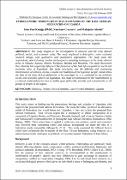| dc.description.abstract | The study hinged on the investigation of ethnicity and the East African political, social, and economic unity. The study employed a descriptive cross- sectional research design, with qualitative and quantitative approaches. The study used 385 respondents, selected using random and purposive sampling techniques in the study selected areas in Masaka, Katuna, Nimule, Kampala, Malaba and Mutukula. The study discovered that, ethnicity has negatively influenced the formation of the East African political, social and economic unity of Ugandans. The study concluded, that the different and contrasting interpretation of cultures, norms, customs and traditions of the Ugandan people cannot allow the idea of the East African federation to be successful as it is projected in the political, social, and economic spheres on Ugandans. The study recommended for the establishment of a cultural model federation that is widely open politically, socially and economically to all groups of people in the region. | en_US |


